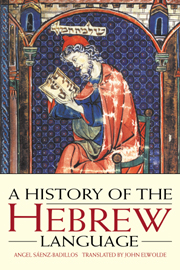Book contents
- Frontmatter
- Contents
- Foreword by Shelomo Morag
- Acknowledgements
- 1 Hebrew in the context of the Semitic languages
- 2 Hebrew, a Northwest Semitic language
- 3 Pre-exilic Hebrew
- 4 Biblical Hebrew in its various traditions
- 5 Hebrew in the period of the Second Temple
- 6 Rabbinic Hebrew
- 7 Mediaeval Hebrew
- 8 Modern Hebrew
- Bibliography
- Index
6 - Rabbinic Hebrew
Published online by Cambridge University Press: 05 June 2012
- Frontmatter
- Contents
- Foreword by Shelomo Morag
- Acknowledgements
- 1 Hebrew in the context of the Semitic languages
- 2 Hebrew, a Northwest Semitic language
- 3 Pre-exilic Hebrew
- 4 Biblical Hebrew in its various traditions
- 5 Hebrew in the period of the Second Temple
- 6 Rabbinic Hebrew
- 7 Mediaeval Hebrew
- 8 Modern Hebrew
- Bibliography
- Index
Summary
Early studies
For many centuries the language of rabbinic literature as a subject in its own right aroused little interest. The tendency among Jewish and Christian grammarians was to neglect Rabbinic Hebrew (RH) in favour of BH, although they were aware of differences between them.
The mediaeval Jewish philologists held widely differing attitudes to the character and importance of RH, as well as to its use in practice. It is even possible that the Karaite-Rabbanite controversy is reflected in such differences. Writers like Saadiah held RH in great esteem, utilizing it particularly in the interpretation of biblical hapax legomena – for Saadiah, the Bible includes only part of the vocabulary of its time, with the rest of the language being conserved in popular tradition recorded by rabbinic literature. Menaḥem b. Saruq, on the other hand, considered RH to be a completely different language from the Hebrew of the Bible, and he only rarely used it for solving linguistic problems. However, this stance was not adopted by the majority of grammarians, whereas the much more positive attitude of Ibn Janaḥ, with his frequent use of comparisons from RH, was to influence other scholars who used this author's works either in the original Arabic or in translation. Nonetheless, the Jewish philologists of Spain hardly ever considered RH as worthy of study in its own right, and included it only marginally in their grammars and dictionaries.
- Type
- Chapter
- Information
- A History of the Hebrew Language , pp. 161 - 201Publisher: Cambridge University PressPrint publication year: 1993

